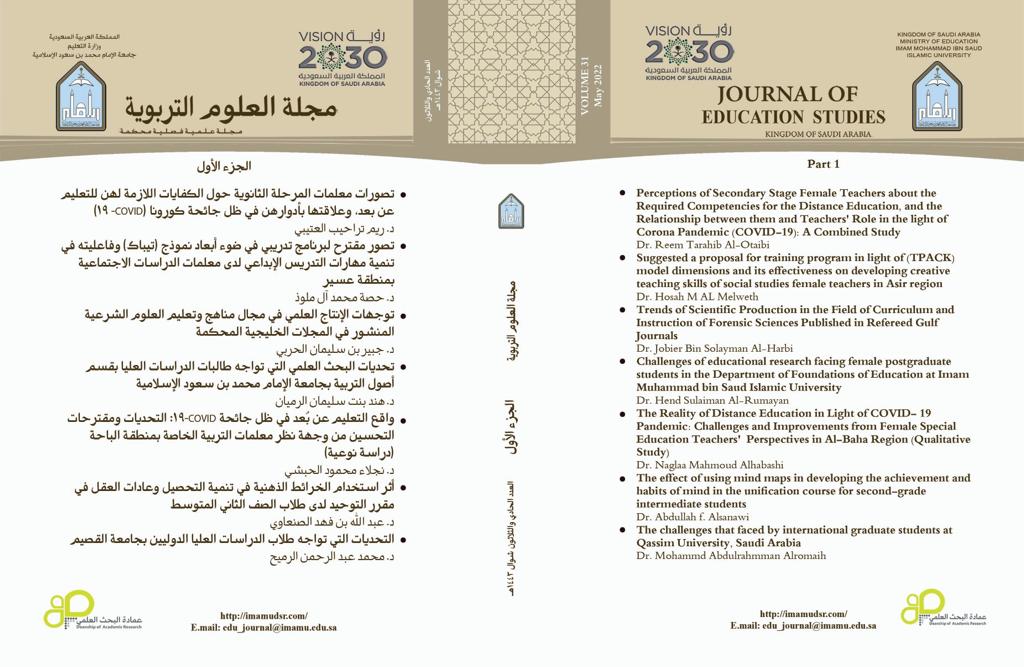Perceptions of Secondary Stage Female Teachers about the Required Competencies for the Distance Education, and the Relationship between them and Teachers' Role in the light of Corona Pandemic (COVID-19): A Combined Study
Keywords:
Perceptions- Efficiencies- Distance Education -The Roles Of Teachers.Abstract
This study aimed to explore the perceptions of secondary school female teachers about the educational and technical competencies needed to study remotely and identify the relationship of those perceptions with their roles in light of the Corona pandemic (Covid-19). To achieve these objectives, a mixed approach with a design (exploratory - sequential) was used, and an in-depth interview and questionnaire were applied as a tool to collect the necessary data to achieve the objectives of this research. The study community consisted of secondary-stage female teachers in the General Directorate of Education in Riyadh for the second semester of the school year 1441H. The study was represented in a random sample of 31% of the entire community. The study reached a set of results, including
- 1. The learning competencies came in the first place with a high degree with a general arithmetic average of (3.32), followed by technical competencies with a medium degree and a general arithmetic average of (3.15).
- 2. The phrase (constantly reviewing the circulars and directives he received on his account in distance education systems and responding to them) came first among educational competencies, with a mean of (3.60).
- 3. The phrase (following the generally accepted rules of fitness, behavior, and ethics stipulated in the network ethics) came first among the technical competencies, with a mean of (3.65).
In light of these results, the study recommends the following: Raising awareness among female teachers of the importance of using distance education in the educational process. Educating female teachers about the importance of knowing their roles in distance learning. They need to know the necessary skills to perform these roles and hold training courses for teachers so that they can work on distance learning systems efficiently.
This study aimed to explore the perceptions of secondary school female teachers about the educational and technical competencies needed to study remotely and identify the relationship of those perceptions with their roles in light of the Corona pandemic (Covid-19). To achieve these objectives, a mixed approach with a design (exploratory - sequential) was used, and an in-depth interview and questionnaire were applied as a tool to collect the necessary data to achieve the objectives of this research. The study community consisted of secondary-stage female teachers in the General Directorate of Education in Riyadh for the second semester of the school year 1441H. The study was represented in a random sample of 31% of the entire community. The study reached a set of results, including
- 1. The learning competencies came in the first place with a high degree with a general arithmetic average of (3.32), followed by technical competencies with a medium degree and a general arithmetic average of (3.15).
- 2. The phrase (constantly reviewing the circulars and directives he received on his account in distance education systems and responding to them) came first among educational competencies, with a mean of (3.60).
- 3. The phrase (following the generally accepted rules of fitness, behavior, and ethics stipulated in the network ethics) came first among the technical competencies, with a mean of (3.65).
In light of these results, the study recommends the following: Raising awareness among female teachers of the importance of using distance education in the educational process. Educating female teachers about the importance of knowing their roles in distance learning. They need to know the necessary skills to perform these roles and hold training courses for teachers so that they can work on distance learning systems efficiently.




